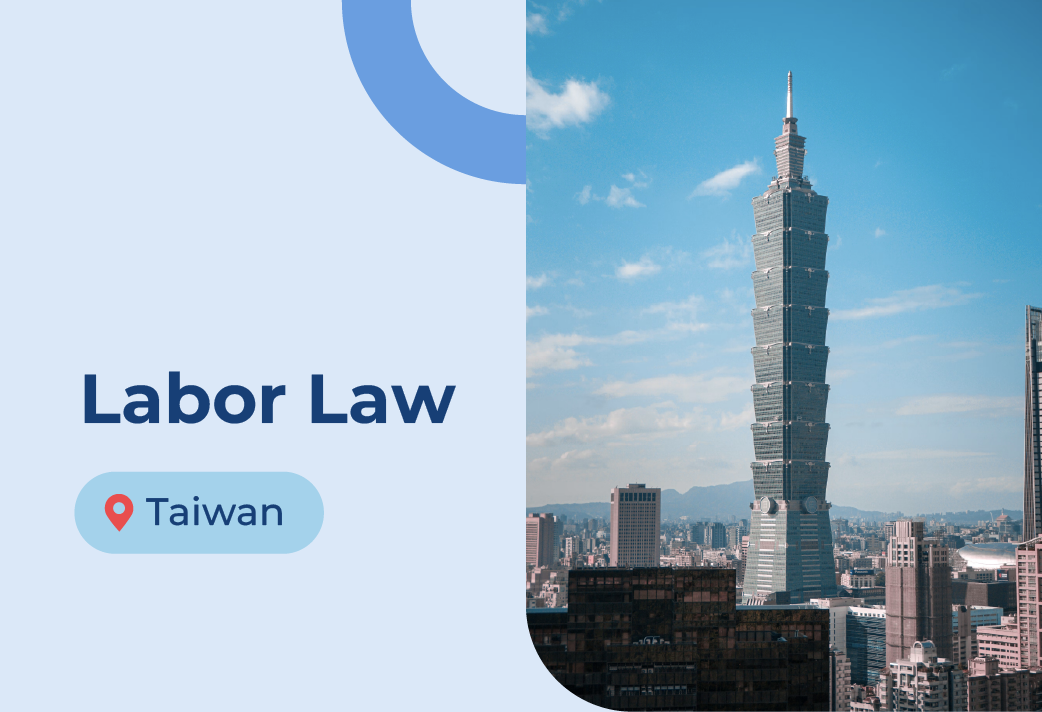Taiwan, renowned for its technological prowess, vibrant culture, and delicious cuisine, also boasts a strategic location in East Asia. For businesses seeking a dynamic and skilled workforce, Taiwan offers a compelling opportunity. However, understanding of Taiwanese labor law and being able to stay compliant is crucial for success.
This comprehensive guide provides a clear overview of key regulations, processes, and best practices to ensure you operate compliantly and foster a positive work environment for your Taiwanese employees.

Tired of scrolling? Download a PDF version for easier offline reading and sharing with coworkers
Understanding the Fundamentals of Taiwanese Labor Law
Taiwanese labor law prioritizes fair treatment and employee well-being. Here are some essential laws to remember:
- Labor Standards Act (LSA) – The cornerstone of Taiwanese labor law, this document regulates key aspects of employment in Taiwan like working hours, minimum wages, overtime pay, and termination procedures.
- Trade Union Act – Defines the framework for trade unions and collective bargaining.
- Gender Equality Employment Act (GEEA) – Prohibits discrimination in employment based on gender and promotes equal opportunities.
Consulting legal professionals or reliable resources from the Ministry of Labor (MOL) is highly recommended for comprehensive information in order to stay up-to-date.
Employment Contracts in Taiwan
Written employment contracts are mandatory in Taiwan. Clearly outline terms like job description, compensation, working hours, benefits, and termination clauses, ensuring compliance with Taiwanese labor law.
- Contracts must be written in Chinese, the official language.
- Probation periods are typically limited to three months, with the possibility of extension under specific circumstances.
- Fixed-term contracts have limitations and require specific justifications.
- Working with Independent contractors means having contractor work agreements
Having clear and legally compliant contracts protects both employers and employees under Taiwanese labor law.
Working Hours and Overtime
The standard workweek in Taiwan is 40 hours, with a maximum daily workday of 8 hours. Respecting Taiwanese labor law regarding working hours and overtime fosters a positive work environment and prevents legal issues.
Overtime is permitted but must be compensated at a rate of at least 36% higher than the regular wage rate for the first two hours and 73% thereafter. Stricter regulations may apply to specific industries or circumstances. Rest periods of at least 30 minutes for a workday exceeding four hours and one hour for a workday exceeding eight hours are mandatory.
Weekly rest periods of at least one full day are also mandated.
Types of Leave in Taiwan: Understanding Worker Entitlements under Taiwanese Labor Law
Taiwanese labor law mandates various types of leave for employees, including:
- Annual leave – Employees are entitled to at least 3 days of paid annual leave after one year of service, increasing with additional years of service, capped at a maximum of 30 days.
- Sick leave – Up to 30 days of paid sick leave are granted based on doctor’s recommendations and length of service. However, companies may offer more generous sick leave policies.
- Maternity leave – Up to 8 weeks of paid maternity leave is legally mandated, though this can also be followed by optional unpaid leave.
- Paternity leave – 3 days of paid paternity leave.
- Special leave benefits – Additional leave may be granted for specific circumstances like marriage, death in the family, or serious illness.
Notice Periods in Taiwan
Notice periods for termination vary depending on the employee’s length of service and nature of employment. However, Taiwanese labor law outlines minimum notice periods, including 1 month’s notice for employees who have been employed for six months or more.
Notice periods can be longer if stipulated in the employment contract, which can be helpful to allow employees time to prepare for their departure and minimize potential disputes.
Termination in Taiwan
- Non-Renewal of Fixed-Term Contracts – If a fixed-term contract is not renewed without a valid reason, the employer may be required to pay severance pay equivalent to one month’s salary for each year of service under the contract.
- Redundancy (closure of a business unit or downsizing) – Requires severance pay calculated based on one month’s salary for each year of service, with a minimum of thirty days’ pay guaranteed.
- Termination with notice without any reason – While uncommon due to the “just cause” standard, if an employer terminates an employee without valid reasons but provides the required notice period, they may still be required to pay severance pay in some situations.
- Termination for misconduct – Generally, severance pay is not required for termination due to employee misconduct. However, exceptions exist if the employer is found to be partly or wholly responsible for the employee’s misconduct.
Establishing an Entity in Taiwan
Venturing into the dynamic Taiwanese market may eventually lead to the establishment of a local business entity. The process can range from straightforward to intricate, depending on the chosen structure.
- Limited Liability Company (LLC) – This is the most popular option for many foreign investors due to its relative ease of setup and limited liability protection. The process involves moderate capital requirements and can be completed in a reasonable timeframe.
- Branch Office – This option might be suitable for representative functions or limited activities. However, it comes with restrictions on operations and higher taxation compared to LLCs. Establishing a branch office is generally the quickest and simplest option, but limitations on scope and tax implications make it less suitable for long-term business goals.
- Subsidiary Company – A separate legal entity from the parent company, offering greater control and flexibility but with a more complex setup process and stricter regulatory requirements. This structure is ideal for companies with significant investment plans and a long-term commitment to the Taiwanese market.
Why Choose an EOR for Your Taiwanese Expansion?
With extensive experience navigating Taiwanese labor law and regulations, an EOR in Taiwan offers several advantages:
- Reduced Risks – EORs handle employment law complexities and Human Resources compliance, minimizing risks and costs that come from Taiwanese labor law non-compliance.
- Streamlined Growth – They manage entity setup, local registration, and compliance with Taiwanese labor law, allowing you to focus on efficient business activities.
- International Experience – Their team possesses localized knowledge of regulations and cultural practices, ensuring smooth operations and employee relations that are aligned with Taiwanese labor law best practices.
- Scalability – EOR solutions adapt to your evolving needs as your business grows in Taiwan, ensuring adherence to Taiwanese labor law as you expand.
By partnering with a reputable EOR, you gain valuable experience, peace of mind, and the freedom to focus on scaling your business successfully in Taiwan, all while maintaining compliance with Taiwanese labor law throughout.
Contact INS Global today to discuss your Taiwanese expansion plans and discover how our EOR solutions can empower your growth plans, ensuring streamlined compliance with Taiwanese labor law throughout your journey.


SHARE